Ken Croswell
Ken Croswell has a Ph.D. in astronomy from Harvard University and is the author of eight books, including The Alchemy of the Heavens: Searching for Meaning in the Milky Way and The Lives of Stars.

Trustworthy journalism comes at a price.
Scientists and journalists share a core belief in questioning, observing and verifying to reach the truth. Science News reports on crucial research and discovery across science disciplines. We need your financial support to make it happen – every contribution makes a difference.
All Stories by Ken Croswell
-
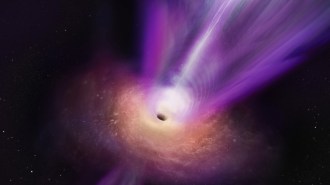 Astronomy
AstronomyThe black hole–powered jet in galaxy M87 is making stars explode
Hubble Space Telescope data show a surprising number of nova blasts along the jet of high-speed gas coming from the galaxy M87.
-
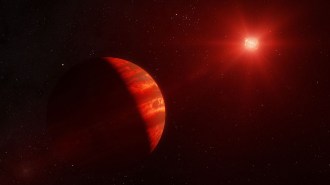 Astronomy
AstronomyJupiter-sized planets are very rare around the least massive stars
A six-year search of 200 nearby low-mass red dwarf stars found no Jupiter-like planets, boosting the standard theory for how such planets form.
-
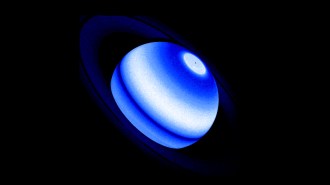 Planetary Science
Planetary ScienceSaturn’s icy rings are probably heating its atmosphere, giving it an ultraviolet glow
Detecting similar emission from a distant world could help astronomers find other planets that boast bright and beautiful rings.
-
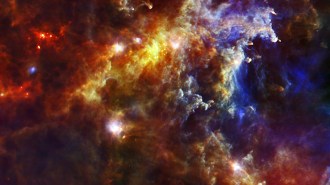 Astronomy
AstronomyThe Milky Way may be spawning many more stars than astronomers had thought
Glowing radioactive debris from massive stars indicates our galaxy mints 10 to 20 new stars a year — double to quadruple the standard number.
-
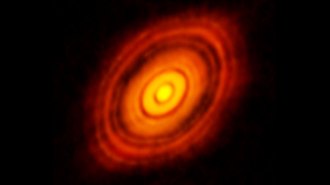 Astronomy
AstronomyMost stars may have much more time to form planets than previously thought
Planet-making disks may survive around most young stars for 5 million to 10 million years — more than double a previous estimate.
-
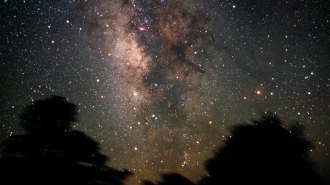 Astronomy
AstronomyA protogalaxy in the Milky Way may be our galaxy’s original nucleus
Millions of ancient stars spanning about 18,000 light-years at the Milky Way’s heart are the kernel around which the galaxy grew, researchers say.
-
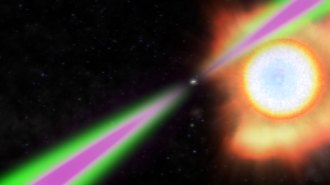 Astronomy
AstronomyThe heaviest neutron star on record is 2.35 times the mass of the sun
The measurement helps refine the dividing line between neutron stars and black holes.
-
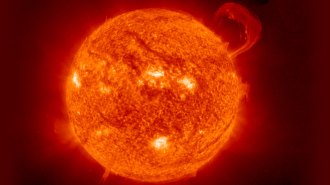 Astronomy
AstronomyNeutrinos hint the sun has more carbon and nitrogen than previously thought
Scientists still don’t know the sun’s exact chemical composition, which is crucial for understanding the entire universe. Neutrinos will help.
-
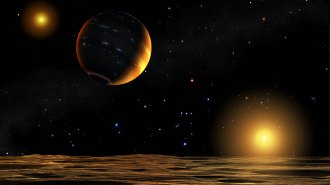 Astronomy
Astronomy‘Goldilocks’ stars may pose challenges for any nearby habitable planets
Orange dwarfs emit far-ultraviolet light long after birth, stressing the atmospheres of potentially life-bearing worlds.
-
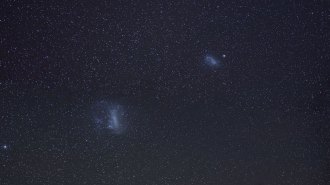 Astronomy
AstronomyWhen the Magellanic Clouds cozy up to each other, stars are born
The Magellanic Clouds, the two closest star-making galaxies to the Milky Way, owe much of their stellar creativity to each other.
-
 Astronomy
AstronomyHere’s the best timeline yet for the Milky Way’s big events
A new study puts more precise dates on when the Milky Way formed its thick disk and collided with a neighboring galaxy.
-
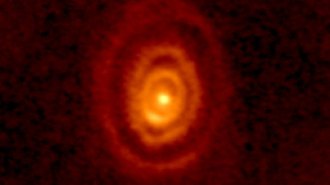 Astronomy
AstronomyA new image captures enormous gas rings encircling an aging red star
The rings, seen for the first time, provide insight into how giant stars lose mass and seed the cosmos with elements.